英语期末复习要点提纲
一年级英语期末复习提纲

一年级英语期末复习提纲
词汇复
- 复已经学过的英语单词,特别是常见的名词、动词和形容词。
- 参考课本和老师提供的词汇表,记忆和拼写每个单词。
语法复
- 复基本的英语语法知识,比如句子的构成、时态、人称代词等。
- 熟练掌握一般现在时、一般过去时和将来时的用法。
句子构造
- 练构造简单的英语句子,包括主谓结构、主谓宾结构和带有
形容词和副词的句子。
- 尝试加入一些连词,如and、but和because,使句子更加复杂和连贯。
听力训练
- 请朋友或家人帮助你进行听力训练。
- 听一些简单的英语对话和文章,并试着理解其中的内容。
阅读理解
- 阅读一些简单的英语故事和文章。
- 理解文章中的关键信息,回答问题或进行简单的写作练。
口语练
- 尝试模仿老师或者英语母语者的口音和语调。
- 练用英语进行简单的日常交流,比如问候、介绍自己和描述物品等。
写作练
- 练书写简单的英语句子和短文,描述你的日常生活或周围的事物。
- 注意语法和拼写的正确性。
复策略
- 分配每天一些时间进行复,保持持续性和规律性。
- 利用复工具,如课本、练册和在线资源,加深对知识的理解和记忆。
注意事项
- 在复期间保持积极的态度,相信自己能取得好成绩。
- 如果有不理解的地方,及时向老师请教或寻求帮助。
祝你期末考试顺利!加油!。
人教版七年级下册英语期末复习:Unit 7-Unit 12 各单元语法知识点复习提纲(全面!)
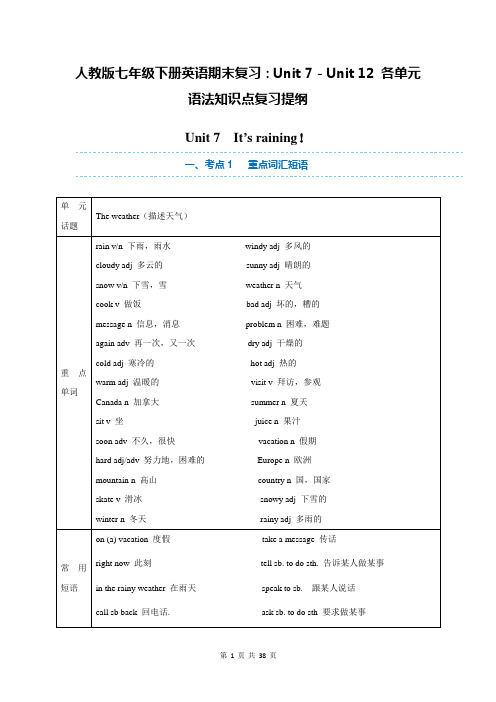
人教版七年级下册英语期末复习:Unit 7-Unit 12 各单元语法知识点复习提纲Unit 7 It’s raining!一、考点1 重点词汇短语1 messagemessage为可数名词,意为“消息,信息”,take a message for sb.“为某人捎个口信”。
拓展:give sb. a message 捎信给某人,leave a message 留口信,get the message 明白对方的意思。
Can I take a message for him?当某人发现要找的人不在或接电话的人发现打电话者要找的人不在时,常用此语2 could 情态动词意为“能,可以“,表示请求许可,在语气上比can委婉客气,但这种句式的肯定回答用can。
Could you just tell him to call me back?3 call及物动词,意为“打电话给”。
call sb. (up) “打电话给某人”,call sb. at +电话号码,意为“拨打……找某人”。
拓展:call 是一个多义词,call sb 可表示“叫醒某人,呼唤某人”;give sb. a call 给某人打电话。
4 back副词“回来,回原处,向后”;call sb. back给某人回个电话。
【即学即练】I’ll _____you _____.我将给你回电话。
5 visit此处用作及物动词,意为“拜访,探望”,后接表示人的名词或代词。
visit还可意为“参观,游览”,后接表示地点的名词。
拓展:visit还可用作可数名词,意为“访问,参观,拜访。
be on a visit to ... “正在访问/参观……”。
visitor参观者,游览者,游客。
I’m having a great time visiting my aunt in Canada._____ my grandparents every year at Christmas.我每年圣诞节都去探望我的祖父母。
高一英语期末考试复习提纲

高一英语期末考试复习提纲一、基础知识回顾A. 语法1. 时态的用法和转换2. 语态的运用3. 从句的种类及使用方式B. 词汇1. 常用词汇的掌握及运用2. 同义词和近义词的辨析3. 词组和短语的使用二、阅读理解A. 不同类型的文章阅读技巧1. 新闻报道2. 广告宣传3. 议论性文章B. 掌握阅读技巧1. 找出主旨和关键信息2. 推理和推断能力3. 理解作者态度和观点三、听力训练A. 提高听力技巧1. 听清关键词和细节信息2. 提高听力速度和准确度B. 听力复习题型1. 对话和短文理解2. 多项选择题3. 填词和填表题四、写作技巧A. 句子结构和段落连贯1. 书面表达的语言规范2. 句子结构的多样性和使用B. 作文写作技巧1. 合理组织文章结构2. 准确表达个人观点3. 使用适当的词汇和句型五、口语表达A. 提高口语交际能力1. 学习常用口语表达2. 提高流利度和准确度B. 口语练习题型1. 对话和演讲2. 给出建议和意见3. 讨论和辩论技巧六、考试技巧A. 考试前的准备1. 制定学习计划和时间安排2. 预测可能出现的题型和重点B. 考试时的应对策略1. 阅读题目注意事项2. 解答题目的技巧和步骤七、常见错误及改正A. 容易出错的语法点1. 过去式和过去分词的区别2. 代词和冠词的使用错误B. 词汇拼写和搭配错误的改正方法1. 查漏补缺常见词汇2. 练习搭配和短语的正确使用八、学习资源推荐A. 阅读材料推荐1. 经典英文小说和故事2. 英语报刊杂志和网站B. 学习工具推荐1. 词典和电子翻译工具2. 在线学习平台和网课资源通过按照以上提纲进行系统复习,相信你能对高一英语的基础知识、阅读理解、听力训练、写作技巧、口语表达、考试技巧等方面有更深入的了解。
希望你能在期末考试中取得优异的成绩!。
一年级英语期末复习提纲

一年级英语期末复习提纲一、基础语法1. 名词英语名词分为可数名词和不可数名词,要掌握它们的单复数变化规则。
2. 代词要掌握常用的人称代词和物主代词,并能正确使用它们。
3. 动词动词是英语语法的重中之重。
要掌握动词的基本形态和各种时态,如一般现在时、一般过去时等。
4. 形容词和副词形容词用来描述名词,副词用来修饰动词、形容词或其他副词,要能正确地使用这两类单词。
5. 介词介词可以表示时间、地点、方式等概念,要能掌握常用介词的用法。
二、基础词汇1. 常用地名掌握英语中常见的各类地名和国家的英文名称,如中国、美国等。
2. 常见动词和形容词掌握常见的英语动词和形容词,如go、play、happy、sad等。
3. 常用短语和句子掌握常用的英语短语和句式,如问候、介绍和感谢等常用场景的基本口语表达。
4. 数字、时间和日期掌握基本的数字、时间和日期表达,如几点了,今天是星期几等等。
三、听力平时要多听英语并说出听到的内容,以此提高听力水平。
四、口语英语口语是语言学习的核心,要多说、多练,增强自己的口语表达能力。
1. 日常用语学会简单的日常用语,如问候、感谢、道歉等。
2. 表达个人观点要能够清晰、有条理地表达自己的观点,如介绍自己的爱好、喜欢的颜色等。
3. 实用句型学会实用句型,如asking for permission(请求许可)、making suggestions (提出建议)等,提高口语表达的准确性。
五、阅读理解英语阅读是语言学习不可或缺的一部分。
1. 基础阅读从简单的句子和段落开始,积累阅读的基础。
2. 扩展阅读阅读更长、更复杂的文本,包括文章、故事和新闻等,扩展阅读能力。
六、写作英语写作能力是语言学习的重要环节。
1. 日常写作写下自己的一些日常活动,如做家务、学习英语等。
2. 话题写作根据老师布置的话题进行写作训练。
3. 套用模版学会使用各种写作模版,如商务邮件、请假条等。
以上提纲为一年级英语期末复习提纲,希望同学们认真复习,取得优异的成绩。
大学英语复习题纲

大学英语复习题纲一、词汇复习1. 重点词汇记忆:掌握本学期所学词汇,包括单词的拼写、词义、用法和例句。
2. 词组搭配:熟悉常用词组及其搭配,能够正确运用在句子中。
3. 同义词辨析:区分近义词的细微差别,提高词汇运用的准确性。
二、语法复习1. 时态:复习各种时态的构成和用法,包括一般现在时、过去时、完成时等。
2. 语态:掌握被动语态的构成和使用场合。
3. 非谓语动词:熟悉动名词、不定式和分词的用法及其在句子中的作用。
4. 从句:复习名词性从句、状语从句、定语从句等的构成和用法。
三、阅读理解1. 快速阅读:练习快速浏览文章,抓住文章主旨大意。
2. 细节理解:通过练习,提高对文章细节信息的捕捉能力。
3. 推理判断:训练根据文章内容进行逻辑推理和判断的能力。
四、写作技巧1. 写作结构:掌握英语写作的基本结构,如引言、主体和结尾。
2. 写作内容:学习如何组织文章内容,使文章条理清晰、逻辑严密。
3. 写作语言:提高语言表达的准确性和多样性,避免重复和单调。
五、听力理解1. 听力技巧:练习听力时的注意力集中和信息捕捉技巧。
2. 听力内容:熟悉不同场景下的对话和独白,提高听力理解能力。
3. 听力练习:通过听力练习题,加强对听力材料的理解。
六、口语表达1. 发音练习:纠正发音,提高语音的准确性和流畅性。
2. 口语表达:学习如何组织语言,进行流畅的口语表达。
3. 情景对话:通过模拟不同场景下的对话,提高口语交际能力。
七、翻译练习1. 英译汉:练习将英文原文翻译成中文,注意语言的准确性和地道性。
2. 汉译英:练习将中文原文翻译成英文,注意语言的准确性和表达的自然性。
八、综合应用1. 模拟考试:通过模拟考试,检验学习效果,查漏补缺。
2. 错题分析:对模拟考试中的错题进行分析,找出错误原因,避免再犯。
3. 学习策略:总结有效的学习方法和策略,提高学习效率。
九、复习建议1. 制定计划:根据自己的学习情况,制定合理的复习计划。
英语复习提纲

英语复习提纲英语是一门全球通用的语言,在现代社会中具有重要的地位。
无论是学术研究、国际交流还是职业发展,掌握英语都是必不可少的。
然而,由于时间和精力的限制,我们需要有一个系统的复习提纲来帮助我们高效地学习英语。
本文将提供一个全面的英语复习提纲,以帮助读者制定合理的学习计划。
一、听力理解听力是英语学习的基础,也是日常交流中必不可少的技能。
为了提高听力能力,我们可以采取以下措施:1. 听英语广播和新闻:通过听英语广播和新闻,我们可以提高对英语语音和语调的理解能力,同时了解国际事务和文化。
2. 听英语歌曲和电影:通过欣赏英语歌曲和电影,我们可以提高对英语的敏感度和理解能力,同时学习地道的口语表达。
3. 听英语教材和录音:通过听英语教材和录音,我们可以熟悉各种语法结构和词汇用法,同时提高听力的速度和准确性。
二、口语表达口语是英语学习的重要组成部分,也是与他人交流的主要方式。
为了提高口语表达能力,我们可以采取以下措施:1. 多与他人交流:与他人交流是提高口语表达能力的最有效方法。
可以通过参加英语角、与外国友人交流或者参加语言交流活动来提高口语表达能力。
2. 多模仿和练习:通过模仿和练习,我们可以提高语音和语调的准确性,同时学习地道的口语表达。
3. 创造语境:通过创造语境,我们可以提高对不同场景下口语表达的适应能力。
可以通过角色扮演、口语训练等方式来提高口语表达能力。
三、阅读理解阅读是英语学习中提高词汇量和语法理解能力的重要途径。
为了提高阅读理解能力,我们可以采取以下措施:1. 阅读英语报纸和杂志:通过阅读英语报纸和杂志,我们可以了解国际时事和文化,同时提高阅读理解能力。
2. 阅读英语小说和故事:通过阅读英语小说和故事,我们可以提高对不同文学风格和表达方式的理解能力,同时扩大词汇量。
3. 阅读英语教材和练习册:通过阅读英语教材和练习册,我们可以系统地学习和巩固各种语法结构和词汇用法,同时提高阅读速度和准确性。
牛津深圳版八年级上册英语期末复习各单元重点知识提纲

牛津深圳版八年级上册英语期末复习各单元重点知识提纲Unit 1: School Life- Vocabulary: school subjects, activities, and facilities- Grammar: present simple tense, adverbs of frequency, and prepositions of placeUnit 2: Family Life- Vocabulary: family members, relationships, and daily routines- Grammar: present continuous tense, possessive determiners, and question wordsUnit 3: My Friends- Vocabulary: describing personality and appearance, hobbies, and interestsUnit 4: Leisure Time- Vocabulary: sports and leisure activities, places, and equipment- Grammar: past simple tense, adverbs of time, expressions for giving opinionsUnit 5: Food and Health- Vocabulary: food and drinks, eating habits, and health problems - Grammar: present perfect tense, for and since, quantifiersUnit 6: Clothes and Shopping- Vocabulary: clothing items, colors, and fashion accessories- Grammar: be going to for future plans, imperative sentences, expressions for making suggestionsUnit 7: Festivals and Celebrations- Vocabulary: traditional festivals, customs, and celebrations- Grammar: would like for polite requests, past continuous tense, expressions for giving adviceUnit 8: Travel and Transport- Vocabulary: places to visit, means of transport, and travel essentials- Grammar: future forms (will, be going to, present continuous), expressions for making predictionsUnit 9: Science and Technology- Vocabulary: inventions, technological advancements, and scientific concepts- Grammar: present perfect continuous tense, passive voice, expressions for speculatingUnit 10: Environment and Sustainability- Vocabulary: environmental issues, natural resources, and ways to protect the environment- Grammar: second conditional, should/shouldn't for advice, expressions for expressing opinions语法要点复- Present simple tense: 表示经常性的动作或常理情况- Present continuous tense: 表示现在正在进行的动作- Past simple tense: 表示过去发生的动作或状态- Present perfect tense: 表示过去发生的动作对现在的影响或结果- Be going to: 表示计划或打算要做的事情- Would like: 表示礼貌地请求或表达愿望- Should/shouldn't: 表示建议或应该做或不应该做的事情- Passive voice: 表示动作的承受者重要于动作的执行者- Imperative sentences: 表示命令、请求或建议- Expressions for giving opinions, advice, suggestions, making predictions, and speculating: 用于表达观点、建议、建议、预测和推测的表达方式以上是牛津深圳版八年级上册英语的各单元重点知识提纲。
英语期末考试复习提纲
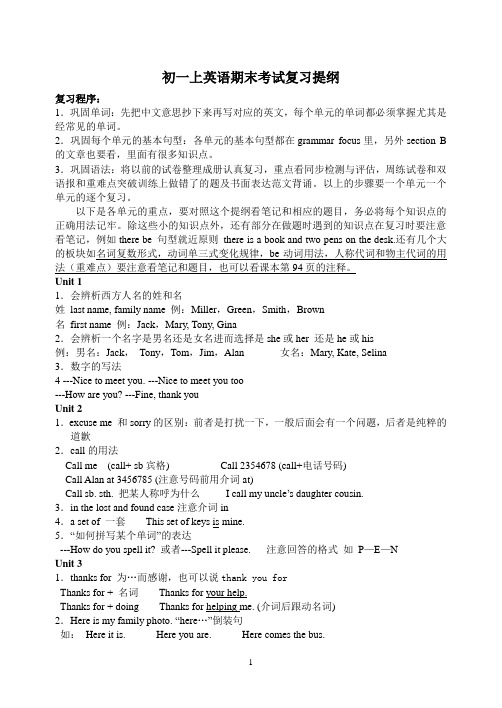
初一上英语期末考试复习提纲复习程序:1.巩固单词:先把中文意思抄下来再写对应的英文,每个单元的单词都必须掌握尤其是经常见的单词。
2.巩固每个单元的基本句型:各单元的基本句型都在grammar focus里,另外section B 的文章也要看,里面有很多知识点。
3.巩固语法:将以前的试卷整理成册认真复习,重点看同步检测与评估,周练试卷和双语报和重难点突破训练上做错了的题及书面表达范文背诵。
以上的步骤要一个单元一个单元的逐个复习。
以下是各单元的重点,要对照这个提纲看笔记和相应的题目,务必将每个知识点的正确用法记牢。
除这些小的知识点外,还有部分在做题时遇到的知识点在复习时要注意看笔记,例如there be 句型就近原则there is a book and two pens on the desk.还有几个大的板块如名词复数形式,动词单三式变化规律,be动词用法,人称代词和物主代词的用法(重难点)要注意看笔记和题目,也可以看课本第94页的注释。
Unit 11.会辨析西方人名的姓和名姓last name, family name 例:Miller,Green,Smith,Brown名first name 例:Jack,Mary, Tony, Gina2.会辨析一个名字是男名还是女名进而选择是she或her 还是he或his例:男名:Jack,Tony,Tom,Jim,Alan 女名:Mary, Kate, Selina3.数字的写法4 ---Nice to meet you. ---Nice to meet you too---How are you? ---Fine, thank youUnit 21.excuse me 和sorry的区别:前者是打扰一下,一般后面会有一个问题,后者是纯粹的道歉2.call的用法Call me (call+ sb宾格) Call 2354678 (call+电话号码)Call Alan at 3456785 (注意号码前用介词at)Call sb. sth. 把某人称呼为什么I call my uncle’s daughter cousin.3.in the lost and found case注意介词in4.a set of 一套This set of keys is mine.5.“如何拼写某个单词”的表达---How do you spell it? 或者---Spell it please. 注意回答的格式如P—E—NUnit 31.thanks for 为…而感谢,也可以说thank you forThanks for + 名词Thanks for your help.Thanks for + doing Thanks for helping me. (介词后跟动名词)2.Here is my family photo. “here…”倒装句如:Here it is. Here you are. Here comes the bus.3.全家福a photo of my family 或family photo4.注意表示亲属关系的词,如,your uncle’s daughter is your cousin.5.注意this that 和these those 的使用译:这是我父母。
人教版七年级英语上册(部编2023) 期末复习提纲

人教版七年级英语上册(部编2023) 期末复习提纲Unit 1: Greetings and Introductions- Greeting people and responding- Introducing oneself and others- Asking and answering personal information questions- Making simple conversations using greetings and introductionsUnit 2: My Family- Describing family members and their characteristics- Talking about family relationships- Using possessive adjectives to describe family members- Sharing information about one's familyUnit 3: School Life- Talking about daily school routines- Describing classroom objects and places- Discussing subjects and school activities- Expressing likes and dislikes about school lifeUnit 4: Hobbies and Interests- Talking about hobbies and interests- Describing activities related to hobbies- Expressing preferences and opinions about hobbiesUnit 5: Food and Drinks- Describing food and drinks- Talking about likes and dislikes of food- Ordering food and drinks at a restaurant- Expressing preferences for different types of foodUnit 6: Colors and Clothes- Learning different colors in English- Describing clothes and their colors- Talking about clothing preferences and styles- Discussing appropriate clothing for different occasionsUnit 7: Numbers and Telling Time- Learning and pronouncing numbers in English- Talking about dates and birthdays- Telling time and discussing daily schedules- Expressing time using both analog and digital formatsUnit 8: Daily Activities- Discussing daily activities and routines- Talking about leisure activities and free time- Using time expressions to describe daily routinesUnit 9: Places in the City- Describing different places in a city- Giving directions to navigate through a city- Talking about likes and dislikes of places- Discussing activities to do in different locationsUnit 10: Occupations and Aspirations- Learning and pronouncing different occupations- Talking about future aspirations and dreams- Describing job responsibilities and characteristics- Discussing personal interests related to future careersUnit 11: Weather and Seasons- Describing different weather conditions- Talking about seasons and their characteristics- Discussing favorite seasons and weather preferences- Expressing feelings and emotions about the weatherUnit 12: Holidays and Celebrations- Learning about different holidays and celebrations- Describing traditions and customs of specific holidays - Talking about personal experiences during holidays- Expressing wishes and greetings for different occasionsUnit 13: Daily Routines- Talking about daily activities and schedules- Using adverbs of frequency to describe routines- Discussing preferences for different activities- Expressing opinions about daily routinesUnit 14: Health and Body- Describing body parts and their functions- Discussing healthy habits and lifestyle choices- Giving advice for maintaining good healthUnit 15: Shopping- Talking about different types of shops and stores- Describing items for sale and their prices- Discussing shopping preferences and habits- Asking for help and making purchases at a storeUnit 16: Transportation- Learning and pronouncing different modes of transportation - Talking about means of transportation and their features- Describing travel experiences and preferences- Asking for transportation information and directionsUnit 17: Countries and Nationalities- Learning and pronouncing different countries and nationalities - Talking about one's own and others' nationalities- Discussing cultural characteristics and traditionsUnit 18: Daily Life in Different Countries- Learning about daily life customs in different countries- Talking about cultural differences and similarities- Discussing traditional food, clothing, and activities- Sharing personal experiences or knowledge about other countries- Talking about different types of technology and devices- Describing how technology is used in daily life- Discussing advantages and disadvantages of technology- Expressing opinions about technology and social mediaUnit 20: Review and Assessment- Reviewing key vocabulary and grammar points from previous units- Practicing listening, speaking, reading, and writing skills请根据这个提纲来复习人教版七年级英语上册的内容。
人教版八年级英语上册期末重点复习提纲

人教版八年级英语上册期末重点复习提纲
一、词汇复
1. 根据课文复重点单词和短语,包括拼写和中英文意思。
2. 运用词汇造句进行巩固练。
二、语法复
1. 复现在进行时、一般现在时、一般过去时的用法。
2. 复被动语态的构成和用法。
3. 复情态动词的用法和意义。
三、听力练
1. 听力练,包括听对话选择正确答案、听短文回答问题等。
2. 使用课本及其他资源进行听力训练。
四、阅读理解
1. 阅读课本中的文章,理解文章的大意和细节。
2. 进行相关的阅读理解题目练。
五、写作练
1. 复书面表达的基本写作技巧,如写作句型和段落结构等。
2. 进行写作练,包括写信、写日记等。
六、口语练
1. 进行口语练,包括对话,描述图片等。
2. 复相关语法和词汇,提高口语表达能力。
七、复技巧和备考方法
1. 总结复经验,制定科学有效的复计划。
2. 尽量多做题,检验自己的掌握程度。
3. 注重练听力和口语,增强应试能力。
以上为人教版八年级英语上册期末重点复习提纲,希望能帮助你对课程内容进行系统复习,取得好成绩。
小学六年级英语下册期末复习提纲

小学六年级英语下册期末复习提纲1. 词汇复- 复并掌握本学期所学的所有单词,包括拼写、读音和词义。
2. 语法复- 复句子结构,包括主语、谓语、宾语、定语和状语的用法。
- 复时态的使用,包括一般现在时、一般过去时和一般将来时。
- 复形容词和副词的比较级和最高级的构成和用法。
3. 句型练- 复肯定句、否定句、疑问句的构成和回答方式。
- 复一般疑问句和特殊疑问句的语序和构成。
4. 阅读理解- 阅读并理解本学期所学的故事和文章,回答相关问题。
- 提高阅读速度和理解能力,注重理解文章的主题、细节和推理。
5. 写作练- 练书写正确的英文字母和单词,注意大小写和造句的准确性。
- 练写短文,表达自己的观点、描述人物和事件等。
6. 口语训练- 练口语表达,包括日常交流用语、询问和回答问题等。
- 练听说对话,提高听力和口语理解能力。
7. 朗读练- 练正确的发音和语调,提升朗读表达能力。
- 练流利朗读短文和故事,注意语音语调和语速。
8. 听力训练- 练听力理解,包括听单词、短语和句子等的听写和理解。
- 练听懂故事、对话和问题等,提高听力技巧和反应能力。
9. 语言运用- 综合运用所学语言知识,进行口语和书面的实际应用练。
- 练解决实际的交际问题,如购物、旅行、问路等。
10. 自主研究- 建立良好的研究惯,自主复所学知识。
- 多做练题,查漏补缺,积累知识。
以上是小学六年级英语下册期末复习的提纲,按照提纲进行有针对性的复习,相信你会取得好成绩!加油!。
人教版九年级上学期英语期末复习: Unit 1- Unit 8 重要知识点提纲(全面!)
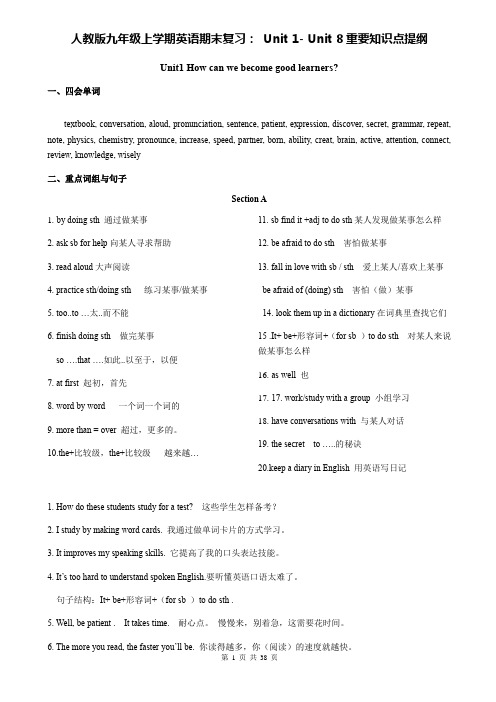
人教版九年级上学期英语期末复习:Unit 1- Unit 8重要知识点提纲Unit1 How can we become good learners?一、四会单词textbook, conversation, aloud, pronunciation, sentence, patient, expression, discover, secret, grammar, repeat, note, physics, chemistry, pronounce, increase, speed, partner, born, ability, creat, brain, active, attention, connect, review, knowledge, wisely二、重点词组与句子Section A1.by doing sth 通过做某事2. ask sb for help向某人寻求帮助3. read aloud大声阅读4. practice sth/doing sth 练习某事/做某事5. too..to …太..而不能6. finish doing sth 做完某事so ….that ….如此..以至于,以便7. at first 起初,首先8. word by word 一个词一个词的9. more than = over 超过,更多的。
10.the+比较级,the+比较级越来越… 11. sb find it +adj to do sth某人发现做某事怎么样12. be afraid to do sth 害怕做某事13. fall in love with sb / sth 爱上某人/喜欢上某事be afraid of (doing) sth 害怕(做)某事14. look them up in a dictionary在词典里查找它们15 .It+ be+形容词+(for sb )to do sth 对某人来说做某事怎么样16.as well 也17.17. work/study with a group 小组学习18.have conversations with 与某人对话19. the secret to …..的秘诀20.keep a diary in English 用英语写日记1. How do these students study for a test? 这些学生怎样备考?2. I study by making word cards. 我通过做单词卡片的方式学习。
一年级英语期末复习提纲

一年级英语期末复习提纲
1. 词汇
•学习英语单词的基本方法
•数字、颜色和家庭成员的英文表达
•公共场所和日常用品的英文表达
•动物和水果的英文表达
2. 语法
•介绍字母表和音标
•简单句和主谓结构的构成
•疑问句和肯定/否定回答
•情态动词can的用法
3. 语音
•基本的发音规则
•单词重音的掌握
•听力技巧和练习
4. 阅读
•理解简单的英文短文
•掌握常用的词汇和短语
•逐字逐句的阅读理解练习
5. 写作
•简单的写作表达和句型
•介绍自己和日常生活
•英文书信和便笺的写作格式
6. 文化背景
•英语国家的文化习俗与节日
•英语国家的传统饮食和音乐
•学习英语的必要性和应用价值
以上是一年级英语期末复习提纲,希望同学们认真学习,巩固复习。
英语期末复习提纲
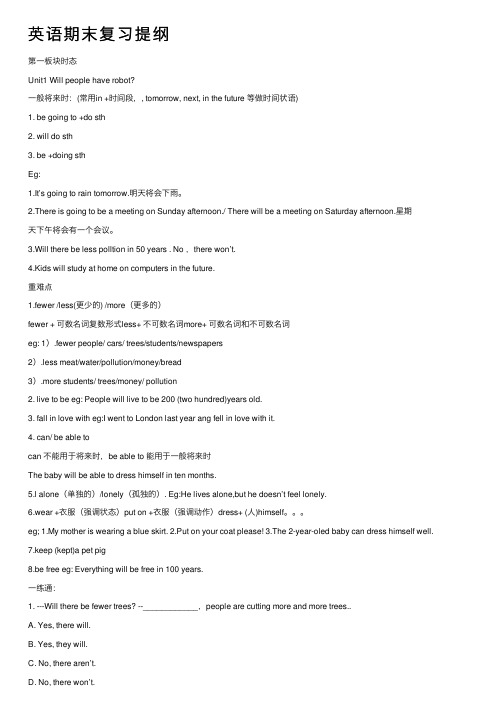
英语期末复习提纲第⼀板块时态Unit1 Will people have robot?⼀般将来时:(常⽤in +时间段,, tomorrow, next, in the future 等做时间状语)1. be going to +do sth2. will do sth3. be +doing sthEg:1.It’s going to rain tomorrow.明天将会下⾬。
2.There is going to be a meeting on Sunday afternoon./ There will be a meeting on Saturday afternoon.星期天下午将会有⼀个会议。
3.Will there be less polltion in 50 years . No ,there won’t.4.Kids will study at home on computers in the future.重难点1.fewer /less(更少的) /more(更多的)fewer + 可数名词复数形式less+ 不可数名词more+ 可数名词和不可数名词eg: 1).fewer people/ cars/ trees/students/newspapers2).less meat/water/pollution/money/bread3).more students/ trees/money/ pollution2. live to be eg: People will live to be 200 (two hundred)years old.3. fall in love with eg:I went to London last year ang fell in love with it.4. can/ be able tocan 不能⽤于将来时,be able to 能⽤于⼀般将来时The baby will be able to dress himself in ten months.5.l alone(单独的)/lonely(孤独的). Eg:He lives alone,but he doesn’t feel lonely.6.wear +⾐服(强调状态)put on +⾐服(强调动作)dress+ (⼈)himself。
八年级上册英语期末复习提纲
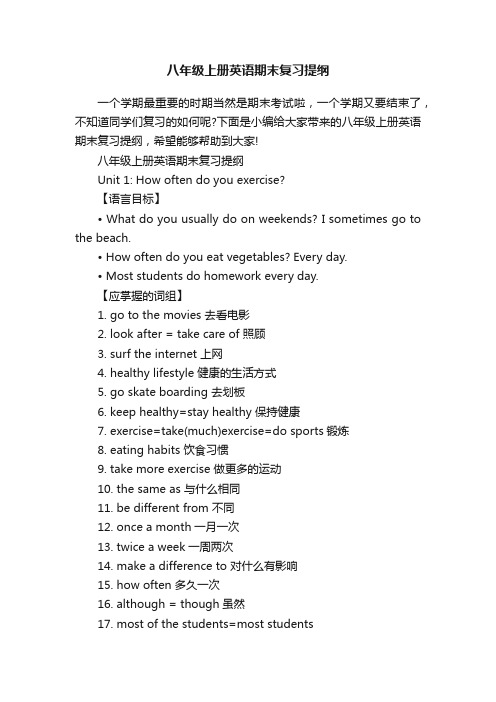
八年级上册英语期末复习提纲一个学期最重要的时期当然是期末考试啦,一个学期又要结束了,不知道同学们复习的如何呢?下面是小编给大家带来的八年级上册英语期末复习提纲,希望能够帮助到大家!八年级上册英语期末复习提纲Unit 1: How often do you exercise?【语言目标】• What do you usually do on weekends? I sometimes go to the beach.• How often do you eat vegetables? Every day.• Most students do homework every day.【应掌握的词组】1. go to the movies 去看电影2. look after = take care of 照顾3. surf the internet 上网4. healthy lifestyle 健康的生活方式5. go skate boarding 去划板6. keep healthy=stay healthy 保持健康7. exercise=take(much)exercise=do sports锻炼8. eating habits 饮食习惯9. take more exercise 做更多的运动10. the same as 与什么相同11. be different from 不同12. once a month一月一次13. twice a week一周两次14. make a difference to 对什么有影响15. how often 多久一次16. although = though虽然17. most of the students=most students18. shop=go shopping=do some shopping 购物19. as for至于 20. activity survey活动调查21. do homework做家庭作业22. do house work做家务事23. eat less meat吃更少的肉24. junk food垃圾食物25. be good for 对什么有益26. be bad for对什么有害27. want to do sth 想做某事28. want sb to do sth想某人做某事29. try to do sth 尽量做某事30. come home from school放学回家31. of course = certainly = sure当然32. get good grades取得好成绩33. some advice34. hardly=not nearly / almost not几乎不35. keep/be in good health保持健康36.be stressed紧张的,有压力的37. take a vacation 去度假48.get back 回来【应掌握的句子】1. How often do you exercise? 你(你们)多久锻炼一次身体?How often + 助动词do(does或did) + 主语 + do sth.? 疑问词how often是问频率(多久一次),(在这里助动词do(does或did) 是起帮助构成疑问的作用)与一般现在时或一般过去时连用,回答一般是用表示频率的副词,如:once, twice, three times…, sometimes, often, quite, often, never, every day, once a week , twice a month , three times a month , three or four times a month 等。
- 1、下载文档前请自行甄别文档内容的完整性,平台不提供额外的编辑、内容补充、找答案等附加服务。
- 2、"仅部分预览"的文档,不可在线预览部分如存在完整性等问题,可反馈申请退款(可完整预览的文档不适用该条件!)。
- 3、如文档侵犯您的权益,请联系客服反馈,我们会尽快为您处理(人工客服工作时间:9:00-18:30)。
Unit1 When is your birthday? 你的生日是什么时候?一、单词与短语January一月February二月March三月April四月May五月June六月July七月August八月September九月October十月November十一月 December十二月spring春天summer夏天autumn秋天winter冬天warm暖和的hot炎热的cool凉爽的cold寒冷的season季节when什么时候where哪里why为什么in在[某月、某年、某季节等]二、句型与语法1.When is your birthday?你的生日是什么时候?It’s in ...(月份)./In ...(月份)./My birthday is in ...(月份).扩展:yourWhen is (男人名)’s/his birthday?(女人名)’s/herMyIt’s in...(月份)./In ...(月份)./ His birthday is in ...(月份).Her2.Happy birthday!生日快乐!Thank you./Thanks.谢谢。
3.Where are you from?你来自哪里?I’m from China./I am from China./China.我来自中国。
4.How old are you?你多大?(how old 用来问年龄)I’m twelve./I’m twelve years old.5.Have you got ...?你有...吗?Yes,I have./No,I haven’t.例:Have you got a pet? Yes,I have./No,I haven’t.6.Do you like...?你喜欢...吗?Yes,I do./No,I don’t.例:Do you like spring?Yes,I do./No,I don’t.Unit2 In the classroom 在教室里一、单词与短语in在...里面on在...上面under在下面behind在...后面in front of在...前面any一些,一点,少许ball球class班级idea主意,计划it它,这,那teacher老师turn轮到的机会curtains窗帘light灯window窗户desk桌子chair椅子board 板子door门floor地板Well done!干得好!good idea好主意二、句型与语法1.There be句型:表示“存在有”,某地有某人或某物There is +单数名词/不可数名词There are+复数名词e.g:There is a book on the desk. 桌上有一本书。
There are some children in the classroom. 教师里有一些孩子们。
注:There be句型是近视眼,依照“就近原则”来选择is或are.e.g:There is a book and two pens on the desk.桌上有一本书和两支笔。
There are some shells and a necklace on the bed.床上有许多贝壳和一条项链。
注意:变问句时将be动词提前。
There is a schoolbag on the desk. 变问句→—Is there a schoolbag on the desk?—Yes, there is./ No, there isn’t.There are four windows in the classroom. 变问句→—Are there any windows in the classroom? (问句中不直接用数量用any)—Yes, there are./ No, there aren’t.2. —What’s this? 这是什么?—It’s the/a ... 它是...—What about this? 那这个呢?—It’s the/a ... 它是... 例:—What’s this? 这是什么?—It’s a floor. 它是地板。
—What about this? 那这个呢?—It’s a cat. 它是一只猫。
3. —Where is ...? ...在哪儿?—It’s in /on/in front of/behind/under ...它在...例:—Where is the cat? 猫在哪儿?—It’s in the schoolbag.它在书包里。
4. —How many ... are there?(how many问数量)这儿有多少..?e.g—How many windows are there? 这儿有多少窗户?—Six/Six windows.六个/六个窗户。
5. —What colour is/are the...? ...是什么颜色的?—颜色/It’s(They are)+ 颜色.e.g—What colour is the board? 板子是什么颜色的?—Black./It’s black.6.Put it + 位置→把它放在... 如:Put it in the teacher’s desk.把它放在老师的桌子里面。
7.It’s my turn. 轮到我了。
Unit 3 Numbers数字一、单词与短语at在... dinner正餐,主餐his他的live生长;栖息lunch午餐shop商店song歌曲take带(走),拿(走);to向,朝,到,往plus加wonderful令人惊叹的,奇妙的,令人高兴的has got有,拥有 minus减,减去how much多少钱look for寻找附加:从1—100数字的英语表示二、句型与语法1.从1—100数字的英语表示one1 two2 three3 four4 five5 six6 seven7 eight 8 nine9 ten10 eleven11twelve12 ---- twenty 20 thirteen13 ---- thirty30f our teen14 ---- f or ty40 fif teen15 ---- fif ty50 (fiveteen fivety)sixteen16 ---- sixty60 seventeen17 ---- seventy70eighteen18 ---- eighty80 nineteen19 ---- ninety90(注意不能掉了“e”)one hundred= a hundred100 two hundred200 几百不加s几十几:“几十”—“几”(几十几用连字号-连接几十和几),例:twenty-one21 twenty-two22 thirty-three 33 ninety-nine992.(1)He/She eats (食物) for breakfast/lunch/dinner.他/她早餐/中餐/晚餐吃了...(食物)。
例:He eats thirty-three bananas for breakfast.他早餐吃了33根香蕉。
(2)I eat (食物) for breakfast/lunch/dinner.我早餐/中餐/晚餐吃了...(食物)。
3.how much问价钱,how many问数量。
How much is the book? It’s 3 yuan.How much are the books? They’re twenty-one yuan.How many socks are there in eleven pairs? Twenty-two.4.—What’s (数字一) plus/minus (数字二)? (数字一)加/减(数字二)等于多少?—It’s (数字三). 等于(数字三)。
例:—What’s fifty-four plus forty-six?—It’s a hundred.Unit4 School 第四单元学校一、单词与短语classroom教室library图书室canteen食堂playground操场computer room计算机房 gym体育馆art美术,艺术class课程cool酷的help帮忙,帮助here在这里of属于...的often经常,时常or或者,还是our我们的stop停止their他们的,她们的,它们的play参加(比赛或运动)会读看懂:have classes上课have computer class 上计算机课have lunch 吃午餐play sports 做体育运动in the classroom在教室里in the computer room 在计算机房里in the canteen 在食堂里on the playground 在操场上了解:China中国America美国Britain英国Japan 日本二、句型与语法1.There be(be=is/are) 句型的问句:—Is there a library? 有一个图书室吗?—Yes, there is./ No, there isn’t.—Are there many classrooms? 有许多教室吗?—Yes, there are./ No, there aren’t.复习指导:联系第二单元的there be句型来复习。
2. Is your school big? 你们的学校大吗?—Yes, it is./ No, it isn’t.3. I(We)….in(on)…We often read in the library. 我们常常在图书馆阅读。
We have classes in the classroom. 我们在教室上课。
We have computer class in the computer room. 我们在计算机房上计算机课。
We play sports on the playground.我们在操场上做运动。
We have lunch in the canteen. 我们在食堂吃饭。
4.be(am/is/are) from 来自第一人称+am 如:I am form China. 我来自中国。
第三人称单数+is 如:He/ She is from Britain. 他/她来自英国。
they/you+are 如:They are from Canada.他们来自加拿大。
5. have/ has got 有第一/二人称及they+have got 如:I have got black hair. 我有黑色的头发。
